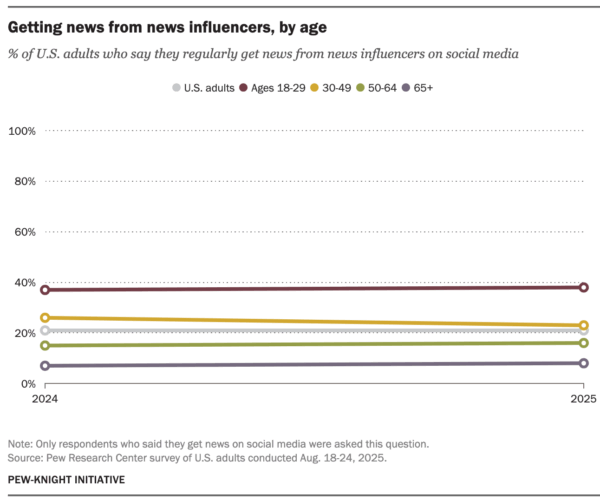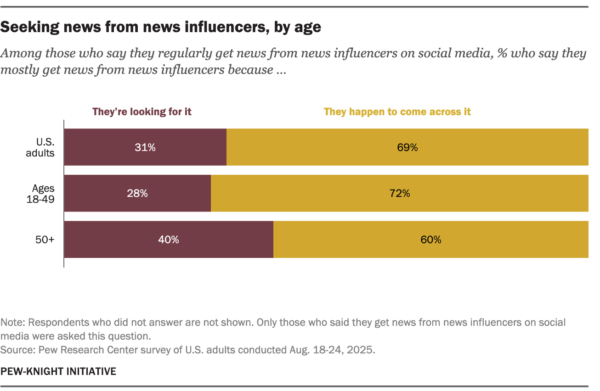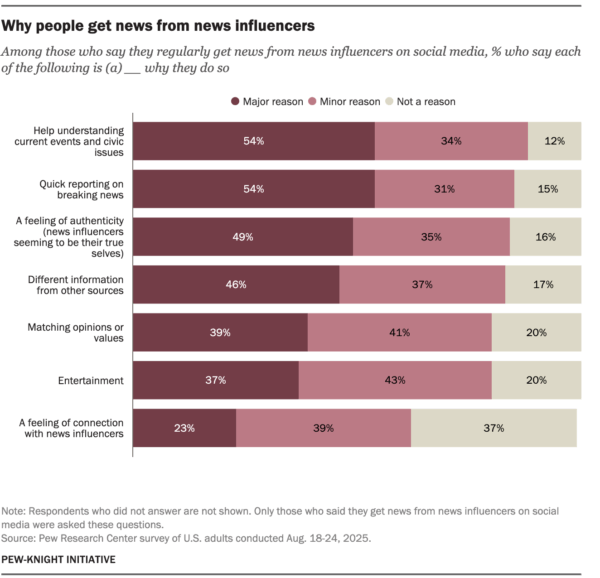News Influencers Fact Sheet
November 7, 2025

News influencers on social media have become a popular alternative to traditional journalists and news organizations as a source of news for many Americans. This fact sheet looks at Americans’ experiences with news influencers on social media. Explore the patterns and trends below.
The fact sheet is part of the Pew-Knight Initiative, a research program funded jointly by The Pew Charitable Trusts and the John S. and James L. Knight Foundation.
Who gets news from news influencers on social media?
About one-in-five U.S. adults (21%) say they regularly get news from news influencers on social media, identical to when we first asked this in 2024.
The term news influencers was defined in the survey as “individuals who have a large following on social media and often post about news or political or social issues.”
Younger adults are especially likely to get news from news influencers, with 38% of those ages 18 to 29 saying they regularly do this – more than four times the share of those 65 and older (8%). There is virtually no difference between Republicans and Democrats in the share who say they regularly get news from news influencers (21% and 22%, respectively, including those who lean to each party).


When people who get news from news influencers on social media are asked why they do this, they do not give one dominant reason. Instead, many cite each of the following as major reasons: Influencers help them better understand current events and civic issues (54%), they are quick in reporting on breaking news (54%), they are authentic (49%), and they offer different information from other sources (46%).
Across different age groups, people who regularly get news from news influencers vary in the reasons they give for doing so. For instance, about half of adults ages 50 and older (52%) say that a major reason they get news from news influencers is because these influencers have opinions or values they agree with, higher than the share under 50 who say this (35%). Older adults also are more likely to say they value authenticity (58% vs. 45%).
Meanwhile, younger Americans are more likely than older people to say a major reason they get news from influencers is that they are entertaining (40% vs. 30%).

Perceptions of news influencers’ affiliation with news organizations
Among U.S. adults who get news from news influencers, 52% say most of these influencers are independent and not connected to a news organization. Just 10% say most of the influencers they get news from are connected to a news organization, while 17% say it’s about an even mix. Another 21% are uncertain whether the influencers they get news from are independent or connected to a news organization.
A 2024 Pew Research Center study from the Pew-Knight Initiative found that 77% of news influencers in our sample had no current or past affiliation with a news organization.

Demographics of news influencer news consumers
As noted earlier, Americans’ experiences with news influencers differ substantially by age. In addition, Black, Hispanic and Asian adults are slightly more likely than White adults to get news from news influencers. Black adults are more likely than White and Hispanic adults to say they get this news because they happen to come across it.
There are minimal differences on these questions based on political affiliation, gender and education.

Source: Pew Research Center survey of U.S. adults conducted Aug. 18-24, 2025.






























